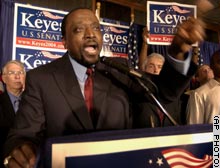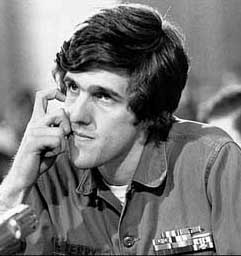Whose Side Are You On?
In his comments on my post yesterday, Mark Noonan asks what my answer to his challenge
is–to wit:
We’ve given the left a pass long enough — its [sic] time for those who are of leftwing opinion to make their final call: which side of the river are you on? If you’re on America’s side, then you want total and overwhelming US victory — and just to really spell it out; this means that our enemies are dead or begging for mercy. I challenge you — choose, and let you be known for what you are by what you choose — patriot, or traitor.
The easy answer would be to say that I don’t take the challenge
seriously (which I don’t) and that I regard the question Do you want complete American victory in Iraq, or are you of another opinion?
as fundamentally confused (which I do). However, perhaps it will be best to lead off by repeating what I said the last time Mr. Noonan asked me for my opinion on the matter:
Finally, even if you were to convince me that Kennedy is entirely in the wrong, I could not possibly see it as an instance of the general principle that you set out: “If you’re on America’s side, then you want total and overwhelming US victory — and just to really spell it out; this means that our enemies are dead or begging for mercy.” It could not be an instance of that principle because the principle is jingoistic claptrap that is obviously and wretchedly false–not to mention dangerous to basic points of republican virtue.
The highest form of love is the love of the virtue in the beloved, and those who are truly “on America’s side”–in any sense of the word that would make it an attitude worth having–are those who want America to live up to its better self. Whether that involves victory in war or not depends entirely on whether the war in question is just or unjust; even if you are right (as I think you are not) that support for this war is righteous, the idea of extending unconditional support for victory in any war that the United States government has committed itself to strikes me as nothing more than belligerent foolishness.
To that I should only add that, as I have argued in The War on Iraq One Year On and What You Mean “We”?, the assault on Iraq and the on-going occupation were not and are not, in fact, anything approaching just or righteous, and that it is becoming more obvious with every day just how ridiculous the demand to take a side
is–where the only sides on offer are the Imperial Legions of the United States and the newly sovereign
Iraqi junta, on the one side, and terrorist jihadis aligned with thugs such as Muqtada al-Sadr, on the other. If those are the two sides of the river, I would rather drown.
I am not on the United States government’s side
. Nor am I on the jihadis’ side
. (As a secessionist republic of one, I have an official policy of non-alignment in this conflict.) I don’t think that loyalty to any side in any conflict is, or can be, a virtue unless it is conditioned by loyalty for the truth and for justice, and what I’ve repeatedly argued in this space is that there is precious little of those in the Bush Administration’s case for war or practice of the war and occupation. (And the same, of course, goes for Mr. al-Sadr and his militia.) If I am on anyone’s side, it is innocent Iraqis who continue to be caught in the crossfire and to have their freedoms squelched, their rights trodden upon, their dignity insulted, and their lives and livelihoods destroyed, by two gangs caught in a bloody, apparently endless turf war.
The best thing that the U.S. government could achieve at this point would be to make it right to what degree they can. And that would mean:complete and immediate withdrawal, an official apology, and war reparations to Iraqi civilians maimed or dispossessed by the war and occupation–or to their heirs if they were among the tens of thousands killed. (The funds for reparations should, ideally, be expropriated from the personal fortunes of George W. Bush, Dick Cheney, Donald Rumsfeld, Condoleeza Rice, Tom Daschle, John Kerry, Tom DeLay, Tony Blair, Jack Straw, José Maria Aznar, Saddam Hussein, Uday and Qusay Hussein, Tariq Aziz, Ahmad Chalabi, et cetera.)
That’s not “complete victory,” in any sense, but there is an important sense in which–since “victory” is, by definition, something worth having, and since it is not worthwhile to achieve dominance in an unjust war–there is no victory possible for the American military in Iraq. There is only conquest. And mere conquest is not something worth having, nor is it something worth wishing for your friends to have.


